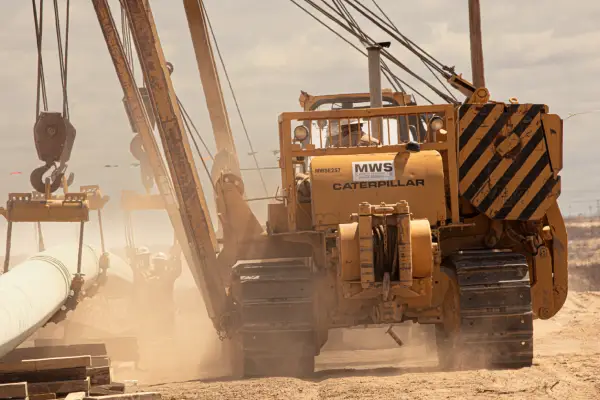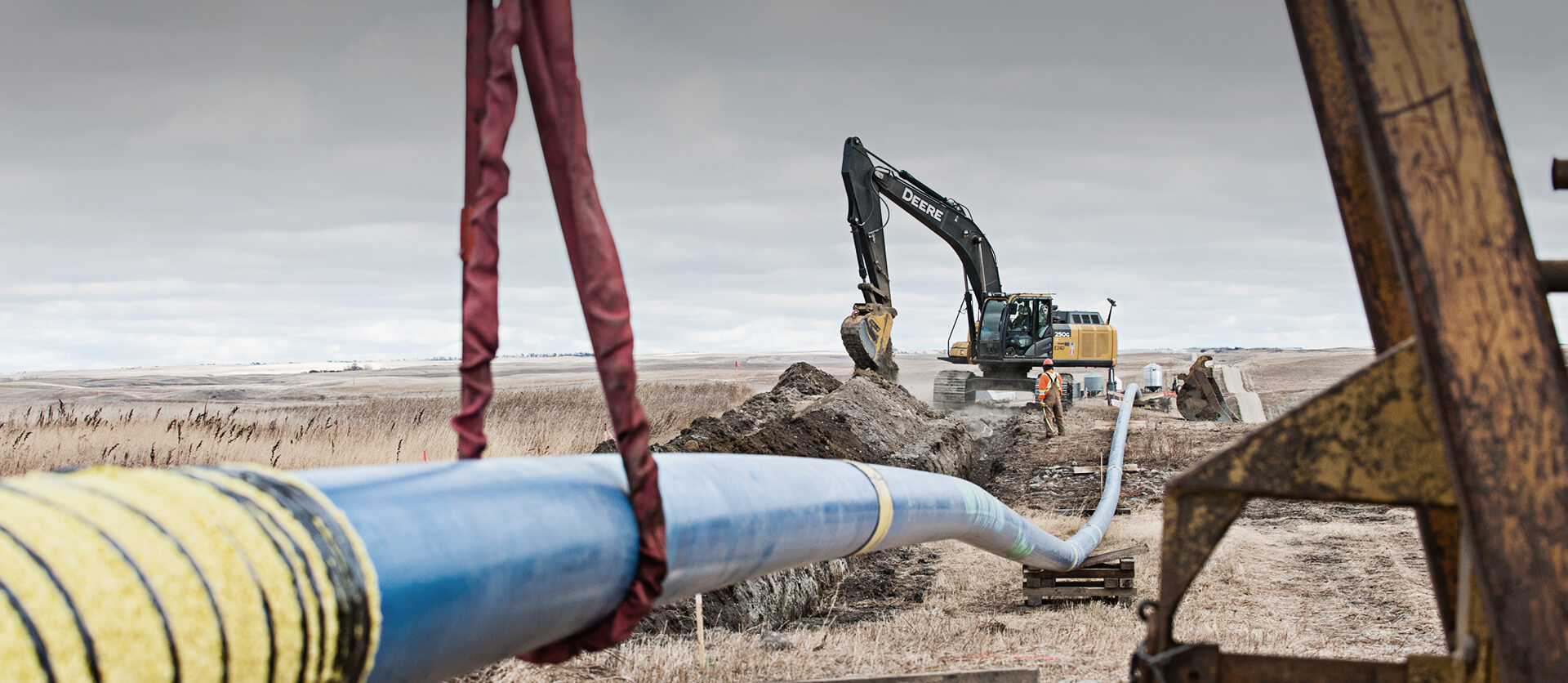The Important Overview to Comprehending Pipeline Construction Providers and Their Significance
Pipeline Construction solutions are essential to the transport of important sources such as water, oil, and gas. These services include thorough preparation and execution, adhering to rigorous safety and ecological standards. As the sector adapts to modern challenges, comprehending its elements and effects becomes progressively essential. What variables add to the growing significance of these solutions in today's economic climate? The complying with sections will certainly discover these critical facets.
Summary of Pipeline Construction Services
Pipeline Construction services include a series of activities necessary for the setup and maintenance of pipes utilized to move numerous materials, consisting of oil, gas, and water. These solutions are important for guaranteeing the reliable and safe activity of resources from one location to an additional. The procedure commonly starts with detailed preparation and style, which thinks about regulative needs, ecological considerations, and logistical obstacles.
When preparation is full, excavation and grading of the land are carried out to prepare the website for Pipeline installation. This is complied with by the actual laying of the pipelines, which includes welding or joining areas with each other to develop a continuous flow course. After setup, rigorous screening is performed to ensure stability and security. Upkeep services are also offered to deal with any type of concerns that might emerge over time. Generally, Pipeline Construction solutions play a pivotal duty in sustaining infrastructure for power and water circulation.
Key Elements of Pipeline Construction
A successful Pipeline Construction project relies upon several crucial parts that assure the effective and risk-free installation of the Pipeline system. Initially, detailed site assessments are essential, as they identify the ecological and geographical elements that might impact Construction. Next off, the selection of appropriate materials, such as installations and pipelines, is vital for protecting resilience and compatibility with the delivered substances.
Furthermore, advanced Construction methods, including trenchless technology and directional drilling, improve performance and lessen ecological influence. Efficient job monitoring is one more essential component, working with labor, devices, and timelines to fulfill project objectives.
In addition, communication among stakeholders, consisting of designers, contractors, and neighborhood authorities, assurances alignment on project requirements and requirements. Extensive quality control actions throughout the Construction process ensure compliance with sector standards and maximize the Pipeline's functional life-span. Jointly, these elements form the foundation of an effective Pipeline Construction job.
Safety Standards and Laws in Pipeline Construction

Governing bodies, such as the Occupational Security and Wellness Management (OSHA) and the Pipeline and Hazardous Materials Safety And Security Administration (PHMSA), stated specific demands that regulate Construction methods. These include procedures for equipment usage, worker training, and emergency reaction procedures. By executing these criteria, Construction firms not just shield their staff members but likewise protected public trust fund. Ultimately, rigorous precaution contribute to the long-lasting success of Pipeline projects, ensuring they satisfy both environmental and operational expectations.
Environmental Considerations in Pipeline Projects

Ecological factors to consider are important to the planning and execution of Pipeline projects. These tasks must evaluate potential effect on environments, water resources, and regional wild animals. Carrying out comprehensive ecological impact assessments (EIAs) is crucial, enabling stakeholders to recognize and reduce threats before Construction starts.
Shielding delicate locations, such as habitats and wetlands, usually needs carrying out specific style features or alternative directing to minimize disturbance. Furthermore, Pipeline drivers are charged with creating methods for stopping spills and leaks, which can have damaging effects on the environment.
Involvement with local areas is crucial, as public issues can lead to job alterations that enhance environmental management. Compliance with laws set by ecological agencies ensures that tasks fulfill sustainability standards, promoting a balance between infrastructure requirements and eco-friendly preservation. Ultimately, dealing with ecological considerations not only safeguards nature however also promotes neighborhood count on and job feasibility.
The Function of Modern Technology in Pipeline Construction
Modern technology plays a crucial role in modern Pipeline Construction, improving efficiency and precision. Advanced evaluating methods permit for exact planning and execution, reducing ecological impact and job hold-ups. Furthermore, the combination of automation and robotics improves operations, decreasing labor prices and enhancing security on Construction websites.
Advanced Checking Methods
Advanced evaluating methods play a crucial function in the effective implementation of Pipeline Construction jobs. These techniques utilize sophisticated modern technology to guarantee precise mapping and analysis of the terrain where pipes will certainly be set up. Strategies such as Geographic Details Equipment (GIS), LiDAR (Light Detection and Ranging), and 3D modeling make it possible for engineers to assess the landscape and picture, recognizing ecological problems and possible challenges. By making use of these advanced devices, teams can improve precision ready and alignment, considerably decreasing the risk of errors throughout Construction. Additionally, real-time information collection enables for instant modifications and notified decision-making throughout the task lifecycle. Inevitably, these surveying developments add to improved efficiency, security, and sustainability in Pipeline Construction initiatives.
Automation and Robotics

Economic Impact of Pipeline Facilities
Pipeline framework plays an essential role in shaping local economic climates and assisting in profession. By supplying a trusted ways of moving oil, gas, and various other commodities, pipelines lower transport prices and improve supply chain effectiveness. This framework draws in financial investment, stimulates task production, and promotes financial growth in bordering locations.
The Construction and upkeep of pipes add substantially to regional economies, producing countless work possibilities in numerous fields, from design to labor. The increase of jobs usually results in enhanced spending in neighborhood organizations, even more bolstering economic task.
Furthermore, pipes enhance energy security by making certain a secure supply of resources, which is essential for industrial operations and household demands. As areas come to be interconnected through Pipeline networks, you could try this out they gain access to more comprehensive markets, raising competition and economic resilience. As a result, the financial effect of Pipeline infrastructure is complex, affecting both instant neighborhood economic situations and wider local advancement.
Future Fads in Pipeline Construction Providers
The future of Pipeline great post to read Construction services is advancing in reaction to technological innovations, governing changes, and expanding environmental factors to consider. Developments such as robotics and drones are streamlining evaluation and upkeep processes, boosting safety and security and effectiveness. Automation is poised to reduce labor expenses and enhance precision in Construction procedures. Furthermore, the raising emphasis on sustainability is prompting business to adopt green materials and practices, lining up with global efforts to decrease carbon impacts.
Regulatory frameworks are likewise adapting to resolve environmental effects, promoting higher openness and accountability in Pipeline tasks. Furthermore, the integration of wise innovations, including real-time monitoring systems, is anticipated to improve the reliability and performance of Pipeline networks. As power needs change towards renewable sources, Pipeline Construction solutions will likely see a rise in tasks associated with biofuels and hydrogen transportation. On the whole, these trends indicate a transformative period for the Pipeline Construction industry, concentrated on innovation and sustainability.
Regularly Asked Concerns
What Kinds of Pipelines Are Typically Built?
Different kinds of pipes are typically created, consisting of oil, sewer, water, and gas pipes - Pipeline Construction Services. Each offers unique functions, helping with the transportation of crucial sources across regions while adhering to safety and security and environmental laws
Exactly how Lengthy Does a Regular Pipeline Project Take?
The duration of a typical Pipeline job varies substantially, often varying from a number of months to a few years. Elements affecting this timeline consist of project complexity, governing approvals, and environmental considerations that should be resolved.
Who Regulates Pipeline Construction Firms?
Pipeline Construction business are managed by numerous federal, state, and local firms, consisting of the Pipeline and Hazardous Materials Safety Management (PHMSA) and state public utility payments, making sure conformity with safety and environmental requirements throughout the Construction procedure.
What Are Typical Materials Used in Pipeline Construction?
Common materials utilized in Pipeline Construction consist of polyethylene, pvc, and steel. Each material supplies distinct advantages such as versatility, resistance, and resilience to deterioration, making them ideal for various applications in transferring gases and fluids.

How Are Pipeline Construction Costs Estimated?
Pipeline Construction expenses are approximated by examining factors such as product expenses, labor rates, task complexity, environmental factors to consider, and regulatory demands (Pipeline Construction Services). Precise expense estimate warranties effective budgeting and project preparation throughout the Construction procedure
Pipeline Construction solutions incorporate an array of click this tasks crucial for the setup and upkeep of pipelines made use of to move various compounds, consisting of gas, water, and oil. An effective Pipeline Construction job counts on numerous key parts that ensure the efficient and risk-free setup of the Pipeline system. Advanced surveying strategies play an essential role in the successful execution of Pipeline Construction jobs. Numerous types of pipelines are typically built, including oil, water, gas, and sewer pipes. Pipeline Construction expenses are estimated by evaluating factors such as material expenditures, labor prices, task intricacy, environmental factors to consider, and regulative requirements.